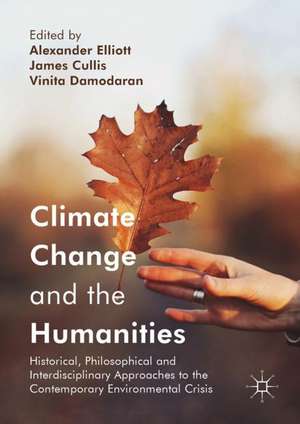Climate Change and the Humanities: Historical, Philosophical and Interdisciplinary Approaches to the Contemporary Environmental Crisis
Editat de Alexander Elliott, James Cullis, Vinita Damodaranen Limba Engleză Hardback – 15 noi 2017
| Toate formatele și edițiile | Preț | Express |
|---|---|---|
| Paperback (1) | 778.45 lei 6-8 săpt. | |
| Palgrave Macmillan UK – 22 aug 2018 | 778.45 lei 6-8 săpt. | |
| Hardback (1) | 783.68 lei 6-8 săpt. | |
| Palgrave Macmillan UK – 15 noi 2017 | 783.68 lei 6-8 săpt. |
Preț: 783.68 lei
Preț vechi: 955.70 lei
-18% Nou
Puncte Express: 1176
Preț estimativ în valută:
149.98€ • 155.100$ • 123.81£
149.98€ • 155.100$ • 123.81£
Carte tipărită la comandă
Livrare economică 12-26 aprilie
Preluare comenzi: 021 569.72.76
Specificații
ISBN-13: 9781137551238
ISBN-10: 1137551232
Pagini: 359
Ilustrații: XII, 271 p.
Dimensiuni: 148 x 210 x 24 mm
Greutate: 0.49 kg
Ediția:1st ed. 2017
Editura: Palgrave Macmillan UK
Colecția Palgrave Macmillan
Locul publicării:London, United Kingdom
ISBN-10: 1137551232
Pagini: 359
Ilustrații: XII, 271 p.
Dimensiuni: 148 x 210 x 24 mm
Greutate: 0.49 kg
Ediția:1st ed. 2017
Editura: Palgrave Macmillan UK
Colecția Palgrave Macmillan
Locul publicării:London, United Kingdom
Cuprins
Chapter 1: Introduction – Alexander Elliott.- Historical.- Chapter 2: The Importance of the Humanities to the Climate Change Debate; Alexander Elliott and James Cullis.- Chapter 3: Understanding climate change historically; Richard Staley.- Chapter 4: The Culture of Islands and the History of Environmental Concern; Richard Grove.- Chapter 5: The Locality in the Anthropocene: perspectives on the Environmental History of Eastern India: Vinita Damodaran.- Chapter 6. Plastic Daffodils: The Pastoral, the Picturesque, and Cultural Environmentalism; Nick Groom.- Contemporary.- Chapter 7: Cli-fi? Literature, ecocriticism, history; Martin Ryle.- Chapter 8: Climate Change as a Challenge to Philosophy; Gideon Calder.- Chapter 9: Belief in change: the role of media and communications in driving action on climate change; Catherine Happer.- Future.- Chapter 10: Climate Change and Future Aesthetics; Emily Brady.- Chapter 11: Investment without return: On futures that will never be ours; Paul Davies.- Chapter 12: Climate Change and Moral Philosophy; Tim Mulgan.
Recenzii
“The chapters in this volume offer nuanced and detailed perspectives on the challenges of knowing and representing climate change. … they provide an extensive overview of a set of cross-temporal environmental themes and make a forceful case for interdisciplinary conversations on climate change.” (Ramya K Tella, Ecology, Economy and Society, Vol. 3 (1), January, 2020)
Notă biografică
Alexander Elliott is a DPhil candidate and Associate Tutor at the University of Sussex, UK, in the department of Social and Political Thought. He is also a graduate associate of the Centre for World Environmental History. His research interests include climate change, epistemology and the history of philosophy.
James Cullis is an MPhil student at the University of Sussex, UK, associated with the Centre for World Environmental History and the Centre for Intellectual History. His research deals with the way environmental and geographic concerns arose within Scottish Enlightenment accounts of societal progress.
Vinita Damodaran is Professor in South Asian History and Director of the Centre for World Environmental History at the University of Sussex, UK. Her publications include Nature and the Orient, Essays on the Environmental History of South and South-East Asia (1998), British Empire and the Natural World: Environmental Encounters in South Asia, (2010) and The East India Company and the Natural World (2014).
James Cullis is an MPhil student at the University of Sussex, UK, associated with the Centre for World Environmental History and the Centre for Intellectual History. His research deals with the way environmental and geographic concerns arose within Scottish Enlightenment accounts of societal progress.
Vinita Damodaran is Professor in South Asian History and Director of the Centre for World Environmental History at the University of Sussex, UK. Her publications include Nature and the Orient, Essays on the Environmental History of South and South-East Asia (1998), British Empire and the Natural World: Environmental Encounters in South Asia, (2010) and The East India Company and the Natural World (2014).
Textul de pe ultima copertă
This volume of essays fills a lacunae in the current climate change debate by bringing new perspectives on the role of humanities scholars within this debate. The humanities have historically played an important role in the various debates on environment, climate and society. The past two decades especially have seen a resurfacing of these environmental concerns across humanities disciplines in the wake of what has been termed climate change. This book argues that these disciplines should be more confident and vocal in responding to climate change while questioning the way in which the climate change debate is currently being conducted in academic, political and social arenas. Addressing climate change through the varied approaches of the humanities means re-thinking and re-evaluating its fundamental assumptions and responses to perceived crisis through the lens of history, philosophy and literature. The volume aims thus to be a catalyst for emerging scholarship in this field and to appeal to an academic and popular readership.
Caracteristici
Reclaims the debate on climate change from the sciences in favour of a more nuanced, interpretative humanities approach
Offers inter-disciplinary chapters organized thematically into History, Philosophy, Ethics, Literature, Sociology and Media in a single volume
Provides readers with an up to date and comprehensive introduction to this dynamic field of research, as well as presenting the most important trends and methodologies in specific humanities subject areas
Provokes a conversation within humanities of the merits of a collaborative field of study centred on climate change
Includes supplementary material: sn.pub/extras
Offers inter-disciplinary chapters organized thematically into History, Philosophy, Ethics, Literature, Sociology and Media in a single volume
Provides readers with an up to date and comprehensive introduction to this dynamic field of research, as well as presenting the most important trends and methodologies in specific humanities subject areas
Provokes a conversation within humanities of the merits of a collaborative field of study centred on climate change
Includes supplementary material: sn.pub/extras
